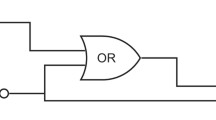Abstract
In this chapter, after an outline of the general principles of operation of a quantum computer, we present several representative quantum algorithms for data processing and error correction. As we will see, these quantum algorithms can outperform their classical counterparts. The material here also serves to motivate the discussion in the next chapter pertaining to the physical implementations of quantum computation.
Access this chapter
Tax calculation will be finalised at checkout
Purchases are for personal use only
Preview
Unable to display preview. Download preview PDF.
Similar content being viewed by others
Chapter 9
A. Barenco, C. H. Bennett, R. Cleve, D. P. DiVincenzo, N. Margolus, P. Shor, T. Sleator, J. A. Smolin and H. Weinfurter, Elementary gates for quantum computation, Phys. Rev. A 52, 3457 (1995).
D. Deutsch, Quantum theory, the Church-Turing principle, and the universal quantum computer, Proc. Roy. Soc. London 400, 97 (1985).
A. Steane, Quantum computing, Rep. Prog. Phys. 61, 117 (1998).
L. K. Grover, Quantum mechanics helps in searching for a needle in a haystack, Phys. Rev. Lett. 79, 325(1997).
P. W. Shor, Algorithms for quantum computation, discrete log and factorizing, in Proceedings of the 35th Annual Symposium on Foundations of Computer Science, edited by S. Goldwasser (IEEE Computer Society, 1994) p. 124; A. Ekert and R. Jozsa, Quantum computation and Shor’s factoring algorithm, Rev. Mod. Phys. 68, 733 (1996).
D. S. Abrams and S. Lloyd, Quantum algorithm providing exponential speed increase for finding eigenvalues and eigenvectors, Phys. Rev. Lett. 83, 5162 (1999).
S. Lloyd, Universal quantum simulators, Science 273, 1073 (1996).
P. W. Shor, Scheme for reducing decoherence in quantum computer memory, Phys. Rev. A 52, R2493 (1995).
A. M. Steane, Error correcting codes in quantum theory, Phys. Rev. Lett. 77, 793 (1996); D. P. DiVincenzo and P. W. Shor, Fault-tolerant error correction with efficient quantum codes, Phys. Rev. Lett. 77, 3260 (1996).
E. Knill, R. Laflamme and W. H. Zurek, Resilient quantum computation, Science 279, 342 (1998).
J. Preskill, Fault-tolerant quantum computation, in Introduction to Quantum Computation and Information, edited by H.-K. Lo, S. Popescu and T. Spiller (World Scientific, 2001), p. 213.
P. Zanardi and M. Rasetti, Noiseless quantum codes, Phys. Rev. Lett. 79, 3306 (1997); D. A. Lidar, I. L. Chuang and K. B. Whaley, Decoherence-free subspaces for quantum computation, Phys. Rev. Lett. 81, 2594 (1998).
Rights and permissions
Copyright information
© 2007 Springer-Verlag Berlin Heidelberg
About this chapter
Cite this chapter
(2007). Principles of Quantum Computation. In: Fundamentals of Quantum Optics and Quantum Information. Springer, Berlin, Heidelberg. https://doi.org/10.1007/978-3-540-34572-5_9
Download citation
DOI: https://doi.org/10.1007/978-3-540-34572-5_9
Publisher Name: Springer, Berlin, Heidelberg
Print ISBN: 978-3-540-34571-8
Online ISBN: 978-3-540-34572-5
eBook Packages: Physics and AstronomyPhysics and Astronomy (R0)




